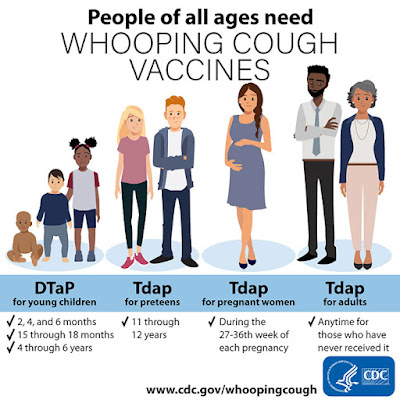Two unvaccinated babies die of whooping cough in Kentucky; health officials urge recommended immunizations

By Melissa Patrick
Kentucky Health News
Two Kentucky infants have died from pertussis, commonly known as whooping cough, within the last six months, according to the Kentucky Department for Public Health. These mark the first pertussis-related deaths in Kentucky since 2018.
Neither the infants nor their mothers had been vaccinated against the disease, prompting health officials to urge all Kentuckians to remain up to date on recommended pertussis immunizations, with an emphasis on the importance of maternal immunization during pregnancy and for all infants beginning promptly at 2 months of age.
“Anyone can get whooping cough, but infants are at greatest risk for life-threatening illness,” Dr. Steven Stack, DPH commissioner, said in a news release. “Fortunately, when vaccinations are administered to pregnant women, it provides protection to both the mother and the baby.”
Whooping cough is a highly contagious respiratory illness spread by coughing and sneezing. Infected people can spread the disease from the start of symptoms and at least two weeks after coughing begins.
Early symptoms of whooping cough look like a common cold, including runny nose, sneezing, mild cough and low-grade fever. After one to two weeks, long coughing spells develop, which often occur in explosive bursts, sometimes ending with a high-pitched whoop and vomiting. This can go on for up to 10 weeks or more, according to the Centers for Disease Control and Prevention.
Babies younger than one year old are at greatest risk of getting whooping cough and having severe complications from it. Young infants may not initially present with classic symptoms and may not even have a cough. Instead, they may just struggle to breathe or stop breathing.
It’s also important to know that some people have mild symptoms and don’t know they have whooping cough, but they can still spread the bacteria to others. Many babies are infected by older siblings, parents or caregivers who may not know they have it.
People with pre-existing health conditions that may be worsened by whooping cough are also at high risk for developing a severe infection.
So far in 2025, there already have been 247 cases of whooping cough in Kentucky, according to the release. In 2024, there were 543 cases, the most since 2012.
“Health officials anticipate that whooping cough will continue to increase during the summer and fall, based on historic trends,” says the release.
The pertussis immunization is combined with the tetanus and diphtheria vaccines (DTaP and Tdap) and is required for Kentucky school children.
Data from the 2024-2025 Kentucky school immunization survey indicate that 86% of kindergarteners and 85% of seventh graders are up to date on their required pertussis immunizations.
Health officials encourage everyone to remain up to date with their pertussis vaccines. This includes:
- All pregnant women should be immunized with every pregnancy to protect their babies.
- Infants should be immunized when they are 2 months, 4 months, 6 months and 12 to 15 months old.
- Children should be immunized before starting kindergarten.
- Teens should be immunized when 11 to 12 years old.
- Teens and adults should be immunized at least every 10 years or sooner if an injury occurs, or to protect a newborn.